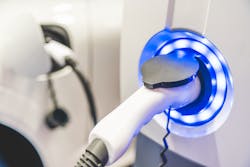EV Charger Applications Expected to Expand Business Opportunities for Electrical Contractors
The installation of EV chargers may eventually be a massive business opportunity for electrical contractors, but it does not come without its challenges. In his 2023 NECA conference seminar on Sept. 30, “From Grid to Charger: How Electrical Contractors Can Capitalize on the EV Mega-Trend,” Matthew Young, ABB’s grid-to-charger leader, said that when sizing up EV charger installations, electrical contractors must work closely with electric utilities to figure how much additional power the EV chargers will need.
Because customers often don’t realize how much power they need, he says electrical contractors need to establish relationships with local electric utilities for these projects. For example, Young said convenience fueling stations, highway truck stops and travel plazas could easily require a fast DC 180kW EV charging system to service eight 300A EV chargers for a total of 2,400A. Larger installations require even more power. For example, a bus depot may require 150kW to 600kW for 40 DC HVC chargers that draw 250A each for a total of 10,000A. Delivery companies with large fleets of trucks that require overnight charging like Amazon, Federal Express or UPS may have even larger power demands. For instance, a single 19kW Amazon installation with 150 100A chargers would draw 15,000A. Amazon may have as many as 400 other sites that might need to charge 150 trucks each night.
He highlighted a long list of future EV charging opportunities for electrical contractors:
- Passenger car rental fleets
- Commercial truck rental/leasing fleets
- Autonomous taxi fleets Young said that they have to do the same on a smaller scale with Level 2 chargers for residential applications because many homes will need to bring in additional power for their chargers.
- Retail supply chain fleets and 3PLs (Target, Kohl’s, XPO, JB Hunt, etc.)
- Charge point operators (Bink, ChargePoint, Electrify America, EVgo, Tesla, etc.)
- Restaurant parking and home food delivery
- Charging integrators, mobile charging and battery integrators
- Large hotel operators, parking decks, multi-family dwellings and local offices
- Retail/shopping centers
- School bus fleets & transit bus fleets
- Seaports & airports
Over the next five to 10 years, Young says electrical contractors will see opportunities develop in these applications, and that to be ready for them they need to have their workers trained in EV charger installations and have relationships established with their local electric utilities.
"It doesn’t happen in every zip code, but when it happens, it happens fast," Young said.
About the Author
Jim Lucy
Editor-in-Chief, Electrical Wholesaling & Electrical Marketing
Over the past 40-plus years, hundreds of Jim’s articles have been published in Electrical Wholesaling, Electrical Marketing newsletter and Electrical Construction & Maintenance magazine on topics such as electric vehicles, solar and wind development, energy-efficient lighting and local market economics. In addition to his published work, Jim regularly gives presentations on these topics to C-suite executives, industry groups and investment analysts.
He launched a new subscription-based data product for Electrical Marketing that offers electrical sales potential estimates and related market data for more than 300 metropolitan areas. In 1999, he published his first book, “The Electrical Marketer’s Survival Guide” for electrical industry executives looking for an overview of key market trends.
While managing Electrical Wholesaling’s editorial operations, Jim and the publication’s staff won several Jesse H. Neal awards for editorial excellence, the highest honor in the business press, and numerous national and regional awards from the American Society of Business Press Editors. He has a master’s degree in communications and a bachelor’s degree in journalism from Glassboro State College, Glassboro, N.J. (now Rowan University) and studied electrical design at New York University and graphic design at the School for Visual Arts.


